Check out this easy guide with top picks of the best outdoor purple vines that grow well in gardens and backyards!
Purple vines can make your garden look really pretty and easily grow along fences, walls, and even up trees for a stunning display. In this list, you’ll find some of the best outdoor purple vines that are easy to grow and take care of.
Best Outdoor Purple Vines
1. Wandering Dude

Botanical Name: Tradescantia zebrina
USDA Zones: 8-11
Wandering dudes are among the most popular outdoor and indoor plants, thanks to their versatile and adaptable growth nature. The leaves have a mix of green, silver, and purple stripes on top, with deep purple underneath. You can let them trail from a hanging basket or train them to climb with support.
Pro Tip: Outdoors, it grows best in warm areas with indirect sunlight or light shade.
2. Ruby’s Necklace Vine
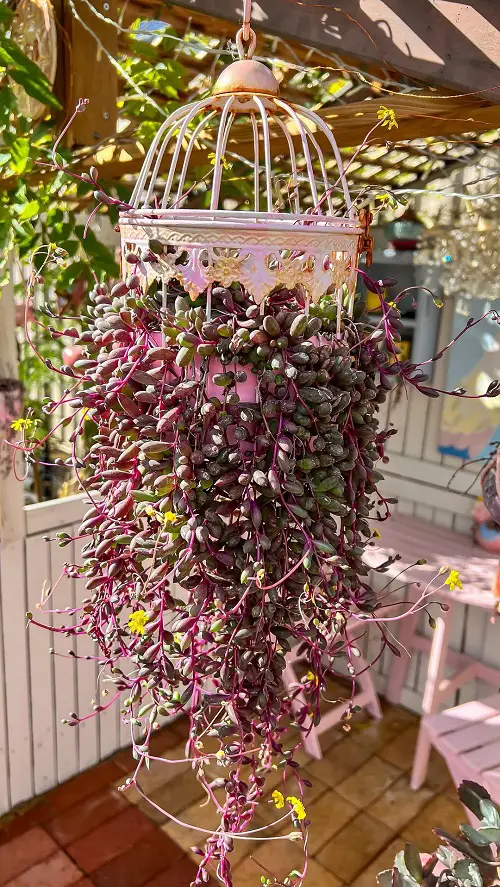
Botanical Name: Othonna capensis ‘Ruby Necklace’
USDA Zones: 9-11
It’s a type of succulent, so it doesn’t need much water and prefers dry, sunny spots. You’ll see bright yellow daisy-like flowers bloom during spring and summer, adding a contrast to the deep purple tones. It stays low to the ground or can trail from a pot, so you can grow it along edges, on shelves, or even in rock gardens.
3. String of Hearts
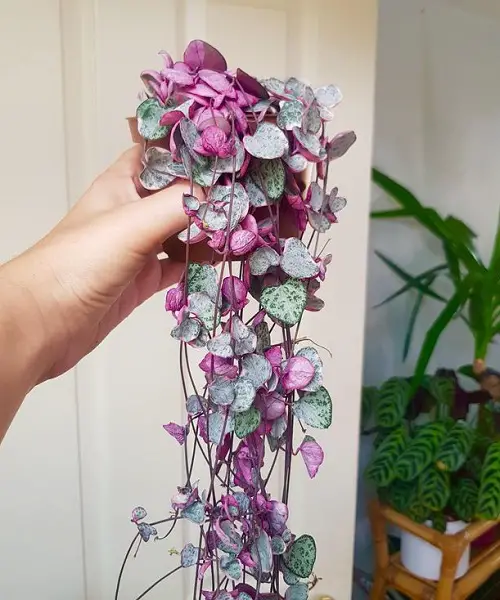
Botanical Name: Ceropegia woodii
USDA Zones: 10-12
Here is another succulent with colorful heart-shaped foliage on purple stems. String of Hearts can be grown outdoors in warm, tropical, or subtropical climates. It can grow up to 12 feet long and hang down with its trailing stems holding the beautiful leaves. Works great in hanging baskets on patios or balconies.
4. Purple Sweet Potato Vine

Botanical Name: Ipomoea batatas
USDA Zones: 9-11
Sweet potato vines are ornamental varieties of edible ones. They are grown for their beautiful and bright foliage, mostly as trailing plants in hanging baskets and vertical setups for their flouncy trailing stems. Their leaves come in many lovely shades, such as black, red, purple, yellow, green, and even variegated ones.
5. Ornamental Grape

Botanical Name: Vitis vinifera ‘Purpurea’
USDA Zones: 6-9
The ornamental grape is all about its decorative foliage, which can change color as it matures with the progress of the seasons. In early spring, the new leaves emerge green with deep lobes that have delicate burgundy tones. As the season changes, these green leaves turn deep purple. It’s great for creating shade or privacy.
6. Bloodleaf
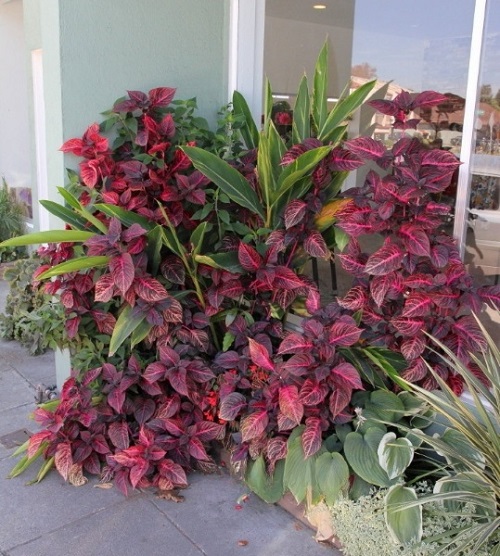
Botanical Name: Iresine herbstii
USDA Zones: 10-11
Bloodleaf is all about the bright, colorful foliage. The leaves can be a deep purple or reddish-pink and glow under sunlight. You can let it trail or train it to grow upright like a small bush, depending on how you trim it. It works well in window boxes, hanging baskets, or garden edges, especially in places that get full to partial sun.
7. Rex Begonia Vine
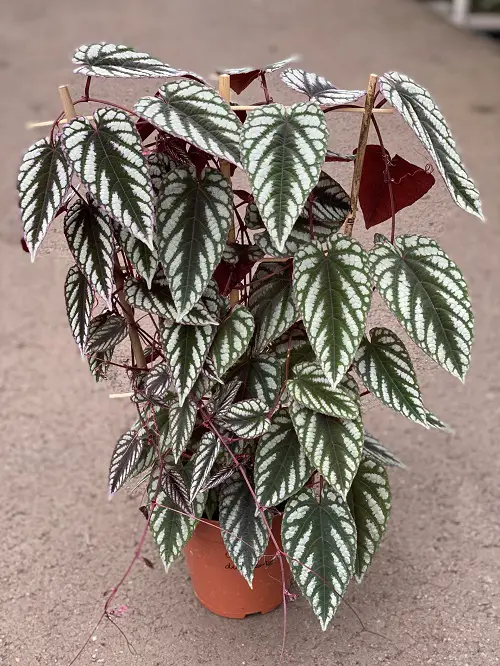
Botanical Name: Cissus discolor
USDA Zones: 10-12
The rex begonia is a beautiful outdoor purple vine pick if you’re looking for one with interesting patterns. The leaves mix silver, green, and purple on top, and are completely purple underneath. This vine can grow up to 10 feet long and either trail down or climb up if it has some support.
Pro Tip: It enjoys warm, slightly humid weather and does best outdoors in partial shade.
Outdoor Purple Flowering Vines
8. Clematis
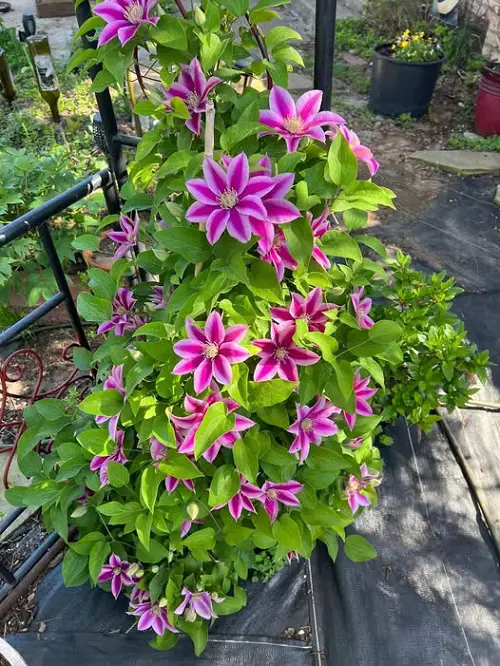
Botanical Name: Clematis species
USDA Zones: 4-8
Clematis vines are known for their showy flowers, and some varieties bloom in deep, eye-catching shades of purple. The flowers can be large and star-shaped and bloom from spring through fall, depending on the type. These vines can grow anywhere from 6 to 12 feet tall and use their twisting stems to cling to trellises, arches, or fences. Cool, right?
Pro Tip: The ones with gorgeous purple flowers are Clematis ‘Rebecca’, Clematis ‘Jackmanii’, and Clematis ‘Cherokee’. Check out more on this list!
9. Wisteria

Botanical Name: Wisteria species
USDA Zones: 5-9
Wisteria is one of the most popular outdoor purple flowering vines, and if you’ve ever seen one in full bloom, you already know why. It puts on a beautiful display of long, hanging clusters of purple flowers in the spring. These vines are fast growers and can stretch 20 feet or more if they have space and a strong climbing structure.
Pro Tip: You’ll need to give them full sun and trim them once or twice a year to keep them under control.
10. Morning Glory
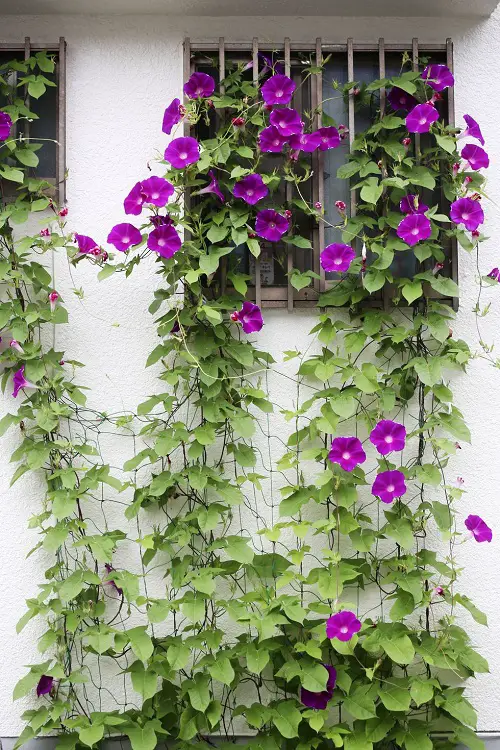
Botanical Name: Ipomoea purpurea
USDA Zones: 2-11
Morning glories are perfect if you want something that grows fast and brings quick color to your garden. The vines can grow up to 12 feet in a single season and bloom with trumpet-shaped purple flowers that open in the morning and close by afternoon. They twine easily around railings, trellises, and poles, making them ideal for vertical spaces.
Note: Just keep in mind that while they’re beautiful, the seeds and leaves can be toxic to pets and small children.
11. Lavender Trumpet Vine
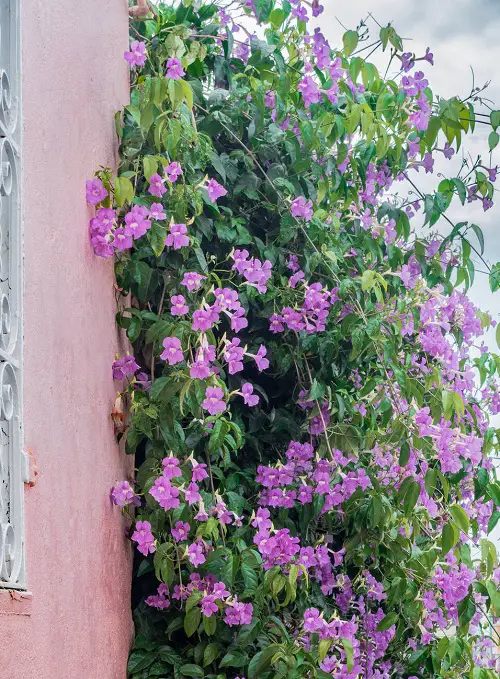
Botanical Name: Clytostoma callistegioides
USDA Zones: 9-11
This is a great choice if you want a softer purple vine with a more relaxed, tropical look. The trumpet-shaped, light lavender flowers with dark veins running through them look lovely against the vine’s shiny, dark green leaves. Its clinging tendrils and woody stems can easily cover fences, gates, or trellises.
12. Purple Hyacinth Bean

Botanical Name: Lablab purpureus
USDA Zones: 10-11
Purple hyacinth grows fast and shows off deep purple stems, flowers, and shiny pods that can be cooked and eaten in some cultures (only after proper preparation). The bright flowers look amazing in late summer and early fall and attract bees and butterflies, too. The plant can reach 10 to 15 feet tall, so you’ll want to grow it along a fence or archway with strong support.
13. Passion Flower

Botanical Name: Passiflora ‘Amethyst’
USDA Zones: 7-11
The purple passion flower blooms with unusual purple flowers with a circular pattern and curly filaments, giving them a unique look. The vine itself can grow up to 10 feet or more and climbs easily using tendrils. You’ll need to plant it in a sunny or lightly shaded spot and keep the soil moist but not soggy for it to flourish.
Fun Fact: This variety is a hybrid between Passiflora kermesina and Passiflora caerulea and is often confused with Passiflora ‘Lavender Lady’. Here are more varieties you can pick!
Here we are at the end, but that’s not all! If you would like to explore some more purple plants, especially ones with purple flowers, check this out and get ready to fall in love again.


